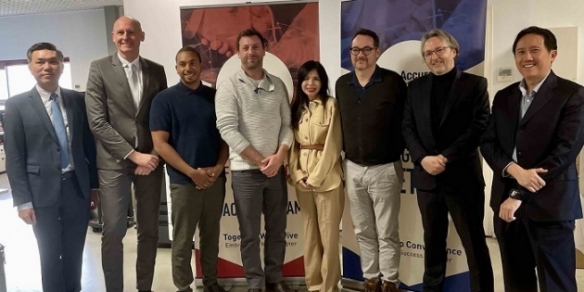Week in Review: There will be less white collar jobs available, thanks to tech
By Karamjit Singh March 10, 2017
- Dealing with digital disruption is causing companies to work towards getting closer to customers
- New types of jobs created, directly or indirectly because of tech, but will demand smart workers
I find myself disagreeing with the optimistic take Accenture has over the future of technology. For the last 17 years the professional services firm has produced an annual look at how technology is developing, called The Technology Vision and how businesses must adapt. This year, it highlights five areas of emerging technology developments that businesses must deal with in an economy that is transitioning rapidly into a digital era.
In its latest Technology Vision, Accenture details how — with advances in artificial intelligence, the Internet of Things (IoT) and big data analytics — humans can now design technology that’s capable of learning to think more like people and to constantly align to and help advance their wants and needs. Accenture makes the point that this “human-centered” technology approach will pay off as leading companies will transform their relationships with customers from being providers to being partners with them.
I know big companies that are ahead of the digital adoption curve are trying very hard to get closer to their customers, feeling this is the best way they can ward off the disruption that digital is causing, especially with customer behavior and expectations changing.
In not so many words, Telenor Group chief president, Sigve Brekke, told me the same thing last June in KL when I asked him how they were dealing with digital disruption. “We have to get very close to our customers,” he said then.
And while there is a healthy dose of real concern over how rapidly evolving technology such as Artificial Intelligence, machine learning and automation could replace jobs that involve replicable tasks, Accenture optimistically believes that “responsive and responsible leaders will ensure the positive impact of new technologies”.
The first responsibility of any business leader is to ensure their business thrives and grows. Any business leader will embrace any technology or combination of, that allows them to get more done with less resources – even if that resource happens to be a worker. And it is happening already. Technology can replace and will replace work done by humans.
I first heard this in Singapore in 2015 while attending a conference on innovation where Singapore’s minister in charge of Smart Nation, Vivian Balakrishnan, gave a speech where he acknowledged that the rapid manner in which technology is developing will mean that “a huge swathe of middle class white collar jobs are at risk.”
Vivian was concerned that “We are on the verge of a potential age of significant middle class unemployment or under employment and stagnating wages.”
Singapore’s response is to try and prepare its citizens to ride the wave that is coming with the option of not responding being that you will get swamped by the wave. It sees its Smart Nation initiative as one anchor to the change that is coming.
Every nation in Southeast Asia, especially those that rely on low-value, labour intensive manufacturing jobs have no choice but to prepare for a world where advancements in technology will inevitably reduce the number of jobs that are available in their current form and shape. It will not happen in the next 5 to 10 years, but it will happen and nations need to be ready.
For sure new types of work and jobs will be created, directly or indirectly because of technology developments – but the reality is that those types of roles will demand talent that is well educated – as both GE and Accenture told me in separate stories I did on their Global Delivery Centres.
Let’s hope SEA policy makers will be ready and let’s not rely on the goodness of technology leaders.
Do enjoy the seven stories we have picked for you, in case you missed any of them.
As my column comes on a Sunday evening instead of its usual, Fri evening, I wish you a productive week ahead.
Editor’s Picks:
Zalora opens regional e-fulfilment hub in Malaysia
Huawei brings its P10 range to Malaysia
Indonesia’s Dattabot, HukumOnline develop legal search engine
Printerous raises US$1.4mil in pre-series A funding
Accenture's positive stance on tech progression
BookDoc aims to break even this year
Celcom eyes postpaid lead in 2017, as it works on regaining prepaid momentum
For more technology news and the latest updates, follow us on Twitter, LinkedIn or Facebook.


